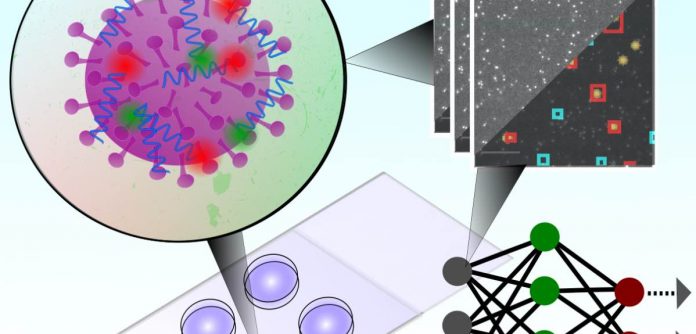Scientists from Oxford University’s Department of Physics have developed an extremely rapid diagnostic test that detects and identifies viruses in less than five minutes.
The method, published on the preprint server MedRxiv, is able to differentiate with high accuracy SARS-CoV-2, the virus responsible for COVID-19, from negative clinical samples, as well as from other common respiratory pathogens such as influenza and seasonal human coronaviruses.
Working directly on throat swabs from COVID-19 patients, without the need for genome extraction, purification or amplification of the viruses, the method starts with the rapid labelling of virus particles in the sample with short fluorescent DNA strands. A microscope is then used to collect images of the sample, with each image containing hundreds of fluorescently-labelled viruses.
Machine-learning software quickly and automatically identifies the virus present in the sample. This approach exploits the fact that distinct virus types have differences in their fluorescence labeling due to differences in their surface chemistry, size, and shape.
The scientists have worked with clinical collaborators at the John Radcliffe Hospital in Oxford to validate the assay on COVID-19 patient samples which were confirmed by conventional RT-PCR methods.
Professor Achilles Kapanidis, at Oxford’s Department of Physics, says: ‘Unlike other technologies that detect a delayed antibody response or that require expensive, tedious and time-consuming sample preparation, our method quickly detects intact virus particles; meaning the assay is simple, extremely rapid, and cost-effective.’
DPhil student Nicolas Shiaelis, at the University of Oxford, says: ‘Our test is much faster than other existing diagnostic technologies; viral diagnosis in less than 5 minutes can make mass testing a reality, providing a proactive means to control viral outbreaks.’
Dr Nicole Robb, formally a Royal Society Fellow at the University of Oxford and now at Warwick Medical School, says: ‘A significant concern for the upcoming winter months is the unpredictable effects of co-circulation of SARS-CoV-2 with other seasonal respiratory viruses; we have shown that our assay can reliably distinguish between different viruses in clinical samples, a development that offers a crucial advantage in the next phase of the pandemic.’
The researchers aim to develop an integrated device that will eventually be used for testing in sites such as businesses, music venues, airports etc., to establish and safeguard COVID-19-free spaces.
They are currently working with Oxford University Innovation (OUI) and two external business/finance advisors to set up a spinout, and are seeking investment to accelerate the translation of the test into a fully integrated device to be deployed as a real-time diagnostic platform capable of detecting multiple virus threats.
They hope to incorporate the company by the end of the year, start product development in early 2021, and have an approved device available within 6 months of that time.








